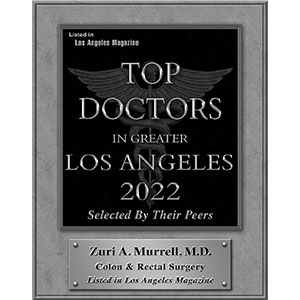Unveiling the Hidden Impact of Fecal Incontinence
Anal or fecal incontinence is more common than people think and affects 2 to 3 percent of the population. Fecal incontinence is the second most common reason for nursing home admission and also affects women who have given birth.
But of all people affected with anal incontinence, only one-third of them talk to their primary care physician about their symptoms. However, the sooner the condition is faced, the sooner treatment can begin. Dr. Murrell, a proctologist in Los Angeles, is proficient in addressing all aspects of fecal incontinence to help patients to return to a more comfortable, free and independent lifestyle.
It is important to remember that fecal incontinence is a symptom, not a condition in itself. Fecal incontinence can be a result of trauma, age, STDs, anal fistulas, childbirth, previous anal operations, primary disease, neurogenic causes, hemorrhoidal prolapse and anorectal neoplasms or growths, all of which need to be addressed with specific treatments unique to each condition.
Anal Incontinence in Women
Childbearing and motherhood present distinct challenges to all mothers and their bodies. Sphincter defects occurred in 35 percent of mothers who delivered their babies vaginally, according to one study. This can cause difficulties controlling stool or gas, but in the majority of cases where a sphincter defect existed, there were actually no immediate symptoms.
For this reason, it is essential that women and their gynecologists discuss the various aspects of delivery, what to expect and options for protecting and healing their bodies during and after childbirth. OB/GYNs are in an unique position to educate their patients about symptoms and best practices in the care of the pelvic organs.
While we do not advocate Caesarean sections, which should be considered with your OB/GYN based on your medical history and the health of your baby, Caesarean sections performed prior to labor do protect the sphincter of the mother and prevent fecal incontinence. Caesareans during labor protect the sphincter but do not always prevent fecal incontinence, which indicates that nerve damage can occur during birth and may affect the ability to control waste functions.
Why Choose Dr. Murrell?
Rest assured, when you choose Dr. Murrell, you’re selecting a world-renowned colorectal surgeon who offers compassionate care and personalized treatment options for patients struggling with anal incontinence. He is here to make you feel seen, heard, and empowered every step of the way.
As a world-renowned colorectal surgeon serving West Hollywood, Los Alamitos, Beverly Hills, and Long Beach, Dr. Murrell focuses on restoring the quality of life for patients struggling with anal incontinence, colon cancer, Crohn’s disease, hemorrhoids, colitis, and IBS using a minimally invasive surgical approach. Dr. Murrell is board-certified in colorectal surgery and was voted Top Doctor for Colon and Rectal Surgeries in 2015-2020 by his peers in Los Angeles Magazine.
Dr. Murrell's expertise and commitment make him the ideal choice for your consultation. Contact us today to take the first step toward regaining control of your health and wellness.
Dr. Murrell's credentials include:
- Named to Southern California Super Doctors® 2015-2017
- Director of the Colorectal Cancer Program at Cedars-Sinai
- Double board-certified and part of the select group of West Coast surgeons specifically trained in minimally invasive colorectal surgery
- Magna Cum Laude graduate of Morehouse College
- Medical Degree at the University of California, Los Angeles
- Top Doctor for Colon and Rectal Surgeries in 2015-2018
- Member of the American Board of Colon and Rectal Surgery
- Member of the American Board of Surgery
- Member of the American Medical Association
- Fellowship in Colorectal Surgery From Cedars-Sinai Medical Center in 2008
- Fellowship in Laparoscopic Colorectal Surgery from the University of California, Irvine in 2007









